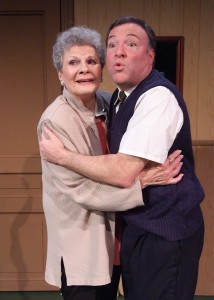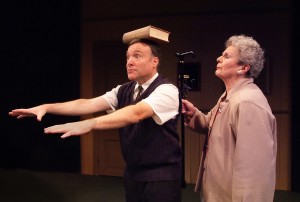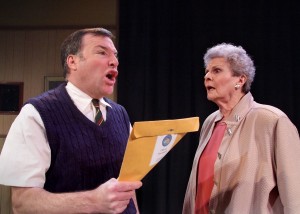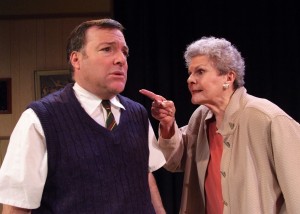WHAT THEATRE 40 NEEDS IS A GUIDE
TO AN EXCRUCIATINGLY CORRECT PRODUCTION
Miss Manners, the alter-ego of writer Judith Martin, is my heroine. Her “Guide to Excruciatingly Correct Behavior” is witty, practical, and is about a lot more than table settings—though she certainly instructs in dining service à la russe, which entails fourteen courses and can really only be carried out with the help of footmen, preferably liveried.
 Fish forks and grape scissors notwithstanding, what fascinates me about manners is their transformational power. Marriages, families, businesses, and governments can be destroyed by ignorance of the ways we ought to properly comport ourselves. And childhoods can be warped.
Fish forks and grape scissors notwithstanding, what fascinates me about manners is their transformational power. Marriages, families, businesses, and governments can be destroyed by ignorance of the ways we ought to properly comport ourselves. And childhoods can be warped.
I should be the ideal audience for Jeffrey Hatcher’s play Mrs. Mannerly, now making its West Coast debut at Theatre 40 in Beverly Hills. It’s a two-hander in the form of a memoir. Hatcher remembers his time as a ten year-old in Mrs. Mannerly’s manners class back in Steubenville, Ohio in 1967.
Nan Tepper as Mrs. Mannerly is onstage virtually the entire show, while Richard Horvitz gets quite a workout, playing Jeffrey as a ten year-old boy as well as an adult, plus six supporting roles—two boys, two girls, a young woman, and a lonely theatre queen.
My enthusiasm for the subject matter and for the playwright’s idea makes it all the more disappointing that the play is underdeveloped and underwritten, and the production plagued with seemingly insurmountable weaknesses.
We’re meant to think of Mrs. Mannerly as some sort of fearsome martinet, the memory of whom can still inspire terror some forty five years after the fact. Tepper lacks the physical and vocal power to take us there. I appreciate that she doesn’t attack the role with exaggerated affectation, but save for a nicely wicked glimmer in her eye here and there, Tepper seems down to earth and full of common sense advice.
When the character is revealed to be living in somewhat seedy circumstances and regularly boozing it up, there’s no feeling of surprise or pathos—not for the other characters or for the audience. The text lacks emotional complexity, but Tepper glosses over what depth there is—sometimes struggling for lines—other times seemingly oblivious to the character’s emotional life.
Horvitz struggles with vocal issues—though not to do with volume or power, but with a lack of variety. Most of his characters sound fairly similar—high pitched and nasal. Some of the physical tics he uses to differentiate the characters are effective but often overused—the best one is his gross upward wiping of one character’s perennially runny nose with his bare hand—it’s quite funny the first few times. By the twentieth time, it’s enough already.
In some areas the script doesn’t make a lot of sense. Mrs. Mannerly twice starts packing up all her things and opining about how her life’s work is at an end. Seeing her packing is a shock to young Jeffrey—but later we find out that the building where Mrs. Mannerly rents classroom space doesn’t allow her to keep things there during the week between each class. Every week she has to pack up, so encountering her in the middle of that activity wouldn’t be unusual to Jeffrey. And though the set is bare and forlorn, much is made of the rugs, silver, and paintings that supposedly adorn the room. If she can’t leave stuff there, how does she get all that crap in and out of the classroom every week? She would need a moving van.
There are secrets: Jeffrey’s reason for taking the class, Mrs. Mannerly’s past, a mysterious manila envelope with some sort of damning evidence of something or other. None of it comes to anything. The revelations we are privy to are not particularly interesting, and the full truth of Mrs. Mannerly’s past is never actually revealed. There’s an old theatrical saw that if someone puts a gun on the mantle in the first act of a play, that gun better go off before the play is over. Well, if you introduce an envelope with a document that could ruin someone’s life, you damn well better let us know what the hell is in it.
Robert Mackenzie is making his directorial debut with Mrs. Mannerly, and an actor himself, his love of performers and the theatre is very much in evidence, yet his lack of experience also shows. The blocking is static; the “jazz hands” device he uses to get props on and off stage is self-consciously precious; and the technical work of his design team is largely inadequate. Bill Froggat’s music cues are unimaginative and badly timed; Michèle Young’s costuming of Mrs. Mannerly has no connection whatsoever to 1967; and Jeff G. Rack’s production design isn’t minimal, it’s nonexistent.
About two-thirds of the way through, Master Jeffrey (as Mrs. Mannerly calls him) asks at what point might a Master be addressed as a Mister. She says that the person doing the addressing makes that call. So we already know what the last line of the play is, and sit there for another half hour waiting.
There’s a note in the program that the 90-minute play is performed without an intermission. On opening night, the producers apparently changed their minds and had one—so we all bought candy in the lobby and went to the bathroom. Maybe Theatre 40 ought to rethink that decision. An intermission gives people a chance to beat a hasty exit, never to return, and some in the audience did.
photos by Ed Krieger
Mrs. Mannerly
Theatre 40 in Beverly Hills (Los Angeles)
ends on December 15, 2012
for tickets, call (310) 364-0535 or visit Theatre 40





